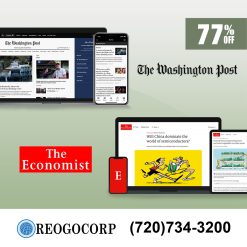Subtotal: $159.00
Health News
UnitedHealth’s Expansion Strategy Is Threatened by US Regulators
UnitedHealth Group Inc., the giant US health-care conglomerate that insures nearly 46 million Americans, reaches into almost every corner of the health system. Beyond the insurer it’s best known for, the company, through its Optum services unit, runs a pharmacy benefit manager that fills 1.4 billion prescriptions annually. It also operates the country’s largest physician workforce—more than 60,000 doctors. Early last year, UnitedHealth bid to expand its reach by purchasing Change Healthcare Inc., a health technology business that operates critical systems for moving data and money between medical providers and insurers—including many of UnitedHealth’s rivals.
To gain its extensive reach, the company has relied on a string of acquisitions, with hardly a peep from regulators in the past. But now the US Department of Justice is seeking to block the $7.8 billion Change deal, arguing it would harm competition. It’s the first major challenge to a health-care merger to go to trial during the Biden administration. The case, which a federal judge in Washington will hear starting on Aug. 1, will test the executive branch’s power to curb the largest health-care companies as they enter new markets and accumulate data on competitors along the way. And a Justice Department win could chill deals involving valuable data in other industries.
Get The New York Times and Financial Times Digital Subscription Combo 77% OFF
UnitedHealth says the combination will make the US health-care system run more smoothly, while the government argues it will let UnitedHealth exploit rivals’ data for its own benefit. “UnitedHealth has all these hands in different areas, and in some ways it’s allowing them to get more efficient and helping the system to get more efficient,” says Morningstar analyst Julie Utterback. “But is that anticompetitive?”
The US is taking the case to trial even after the companies agreed to divest some overlapping businesses. It’s a sign of greater scrutiny under President Joe Biden’s more assertive antitrust agenda. “They’re looking into those deals that previously never got a look,” says Andrew Lacy, an antitrust attorney at Goodwin not involved in the case. Competition regulators are also looking beyond consumer harm—long the core concern of antitrust enforcement—to ask how combinations affect labor markets or data and privacy issues. “Agencies are kicking the tires on potential new theories,” Lacy says.
While the Justice Department argues that UnitedHealth’s tieup with Change threatens to reduce head-to-head competition in a market for esoteric insurance software called claims editing, the case hinges on a more unusual argument: Acquiring Change’s business would give UnitedHealth sensitive data on other insurers that it could use to undermine competition and raise costs for rivals.
Change operates a clearinghouse that routes electronic claims and payments between insurers and medical providers. UnitedHealth has its own clearinghouse. The US alleges that competing insurers prefer Change’s independent platform, and that a desire for “unfettered” access to Change’s data on competitors motivated the deal.
Get The Wall Street Journal Newspaper | WSJ Newspaper | WSJ Print Save 30% Off
The data that flows through Change’s network—and a decade’s worth of data on billions of insurance claims—would give UnitedHealth information on competitors’ plan designs, benefits, provider networks, and reimbursements, the US argues. UnitedHealth’s insurance subsidiary could use this to try to bid on the most profitable customers in the large-employer market while avoiding riskier clients, Justice says. It also warns that UnitedHealth could poach innovations developed by rival insurers and raise their costs for using Change’s network.
UnitedHealth and Change say that UnitedHealth has a clear history of protecting rivals’ data in its existing businesses. The company already has access to competitors’ information, notably in its Optum Insight data and consulting business, which Change would join. In court filings, UnitedHealth says it has “firewalls” in place to safeguard sensitive information and has a record of protecting it. Exploiting such data “would be economic suicide” for the business, the company says in filings, because external customers would flee. The two companies also say they’ve agreed to divest the claims-editing business where they compete head to head. “No competitor to [UnitedHealthcare] wants to work with Optum if there was any risk of that leading to a loss of competitiveness, and that’s a religion we really operate by,” UnitedHealth Chief Executive Officer Andrew Witty said in an interview with Bloomberg last year.
Not everyone in health care trusts UnitedHealth’s assurances. After the deal was announced, the American Hospital Association told regulators that putting Change’s data in UnitedHealth’s hands “would impact (and likely distort) decisions about patient care” and payments, harming consumers and health-care providers. The group called firewalls inadequate and pointed out that executives often move between the company’s insurance business and its Optum services division.
Get The WSJ Print Edition – The Wall Street Journal Newspaper 52-Weeks Delivery Save 30% Off
UnitedHealth says the merger will simplify transactions, smooth friction in the health-care system, and reduce waste. “Its professed mission is to make the health system more efficient,” says Jefferies analyst David Windley. As the company seeks to recruit thousands more physicians to its Optum care delivery business, owning Change’s “pipes” could reduce administrative headaches and make Optum a more appealing place for doctors to work, he says.
The potential conflicts that opponents of the Change deal cite will only loom larger as UnitedHealth continues to diversify beyond insurance. Optum accounts for half the company’s operating profit, up from 15% a decade ago, and its doctors care for patients of the UnitedHealthcare insurance business and rival insurers. Optum sells billing and collection services to hospitals that also contract with UnitedHealthcare.
In a handful of cases, hospital systems such as the Bay Area’s John Muir Health have hired Optum Insight to run nonclinical operations, including billing, technology, purchasing, and other functions, bringing hundreds of the hospital’s administrative staff onto Optum’s payroll.
The Change purchase is hardly a make-or-break deal for UnitedHealth, whose market value approaches half a trillion dollars. Change’s $3.5 billion in revenue last year is equivalent to about 1.2% of UnitedHealth’s. The government’s challenge hasn’t impeded UnitedHealth’s dealmaking. In recent months it agreed to purchase LHC Group Inc., a large home-health business, and UK health tech company EMIS Group Plc. It also closed acquisitions of large doctor’s practices in Massachusetts and Texas.
Get Barron’s Digital Subscription 5 Years
But if the court blocks the Change deal, the decision could spotlight the challenges ahead for an enterprise that reaches deeply into so many parts of the health-care system. CEO Witty has focused on tying the insurance and Optum services businesses more closely together, with a focus on improving consumers’ experience. Rival insurers including Cigna, Elevance Health (formerly Anthem), and CVS Health are trying to replicate elements of UnitedHealth’s vertical integration, combining insurance, prescription benefits, pharmacies, and care delivery.
Witty is scheduled to testify at the 12-day trial. So is his predecessor, David Wichmann, who put the Change deal together and retired weeks after it was announced. In its answer to the US complaint, UnitedHealth says the government’s case relies on “vague and speculative theories” that are “unsupported by any past conduct,” namely that the company will use Change to unfairly advantage its UnitedHealthcare insurance business.
Testing new theories in court is part of the Biden administration’s antitrust push. “Settlements do not move the law forward,” Jonathan Kanter, the Justice Department’s antitrust chief, said in a January speech. “We need new published opinions from courts that apply the law in modern markets in order to provide clarity to businesses.”

 The Economist Digital Subscription 2-Year for only $159
The Economist Digital Subscription 2-Year for only $159 







